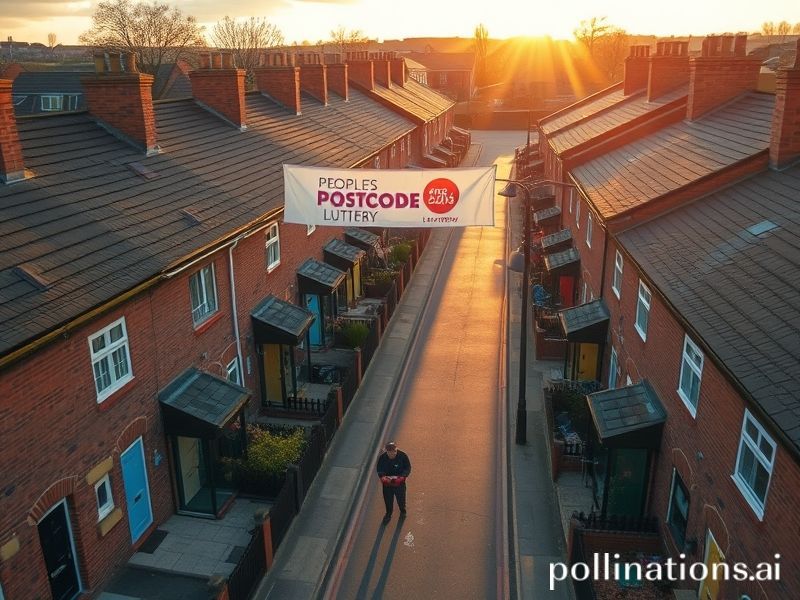Your Postcode Is Your Passport to Predictability: A Global Tour of Six-Digit Destiny
Somewhere between your passport and your preferred brand of toothpaste, your postcode has quietly become the single most revealing thing about you. Not your Spotify Wrapped, not your browser history, not even your ex’s drunk texts—just those five or six alphanumeric characters that let everyone from hedge-fund algorithms to border guards triangulate your probable life expectancy, credit score, and willingness to pay extra for oat milk. Welcome to the 21st-century caste system, tastefully disguised as a mailing address.
In London, SW1A 1AA means you can walk to work past armed police without ever smelling fried chicken. In Lagos, 100001 means you probably have a generator humming like a depressed lawnmower and a security guard who moonlights as a philosopher. In Tokyo’s 100-0001, your elevator apologizes to you in three languages, while 730-0841 in Hiroshima reminds residents—politely—that history has opinions about where you live. Same digits, wildly different baggage allowances.
The United Nations doesn’t officially track postcodes, which is adorable. Instead it outsources the job to credit-card companies, ride-share apps, and that smug little banner that pops up on booking sites: “Only 2 rooms left—9 others looking!” The banner, naturally, already knows whether you’re browsing from 90210 or 90220; one zip code suggests you’ll spring for the suite, the other suggests you’ll split a hostel bunk and like it. Artificial intelligence has replaced astrology; Silicon Valley just added better graphics.
Global capital follows these invisible borders like bloodhounds. Venture capitalists in Singapore’s 238863 will fund a fintech for people in India’s 400001 who will, in turn, hire customer-service reps in Manila’s 1630. The money loops the planet in milliseconds, but the workers still have to show up somewhere with actual plumbing. Meanwhile, the International Monetary Fund politely pretends that geography is irrelevant—right up until it issues travel advisories warning citizens of 90210 to avoid 400001 after dark. The circular hypocrisy could power a small wind farm.
Climate change, ever the equal-opportunity destroyer, is nonetheless democratic enough to respect postal boundaries. Wildfires politely wait until they cross from 90272 to 91364 before torching the cheaper houses first. Floods in Bangladesh’s 1212 don’t care that your cousin in Hamburg’s 20095 just installed floating furniture; rising seas scan barcodes, not moral worth. Insurance companies, those great moral philosophers of our age, price premiums accordingly. Actuaries now speak fluent postcode; they can recite mortality tables by ZIP like beat poetry.
Authoritarian regimes—never ones to miss a branding opportunity—have weaponized the postcode into social credit with a roof over its head. In China’s 610000 district, facial recognition cameras greet residents by name and current social-credit score: “Good morning, Citizen Wang, your recycling bin was 12% fuller than last week; please try harder.” In Russia’s 119019, opposition candidates somehow never manage to collect enough signatures from their own building. The algorithm is apolitical, you see; it simply knows that 119019 statistically leans heavily toward 86% approval. Math has such tidy morals.
Even death respects the digits. During the pandemic, New York’s 10025 suffered more fatalities than entire nations, while 10022 ordered truffle-oil hand sanitizer by the caseload. Morgue trucks parked outside hospitals had routing numbers that matched their cargo’s final address. The obituaries section began to look like a real-estate circular.
And yet—because humans are perversely hopeful creatures—people still treat postcodes as temporary. Refugees clutch scraps of paper bearing future addresses in Berlin’s 13347, convinced the numbers will reinvent them. Digital nomads brag about “geo-arbitrage,” earning in USD while spending in 11800 pesos, as if Wi-Fi magically neutralizes local sewage systems. The postcode remains the last honest mirror: it reflects not just where you are, but where the world has decided you’re allowed to stay.
So the next time you type your postcode into a website, remember you’re not just ordering groceries. You’re submitting a biometric sample, a curriculum vitae, and a confession—compressed into a handful of keystrokes the planet already knows by heart. The algorithm will nod, file it under “predictable,” and send you targeted adverts for coffins or condominiums, whichever comes first. In the end, your postcode is the punchline to a joke the universe told while you were busy updating your address.







